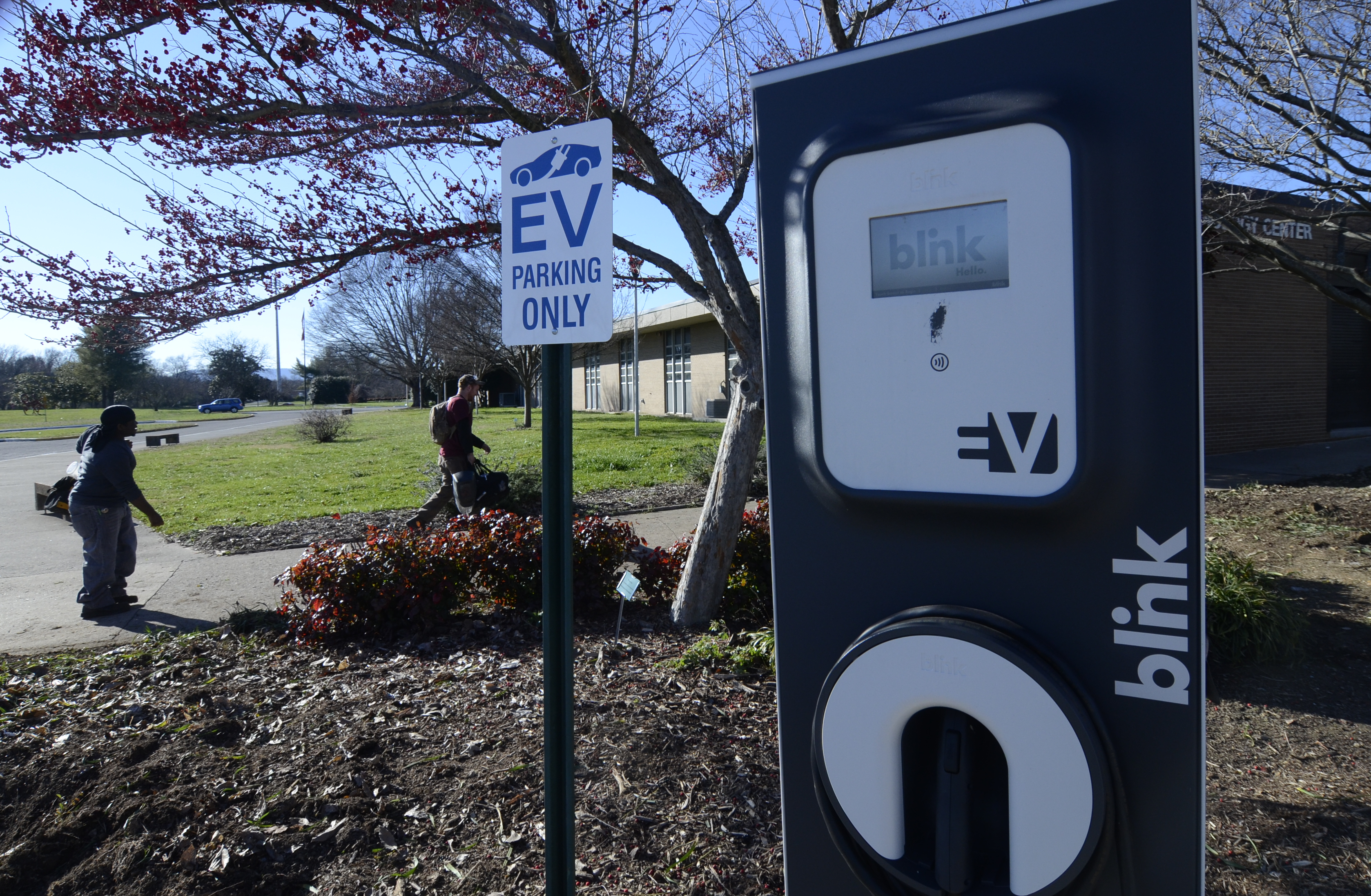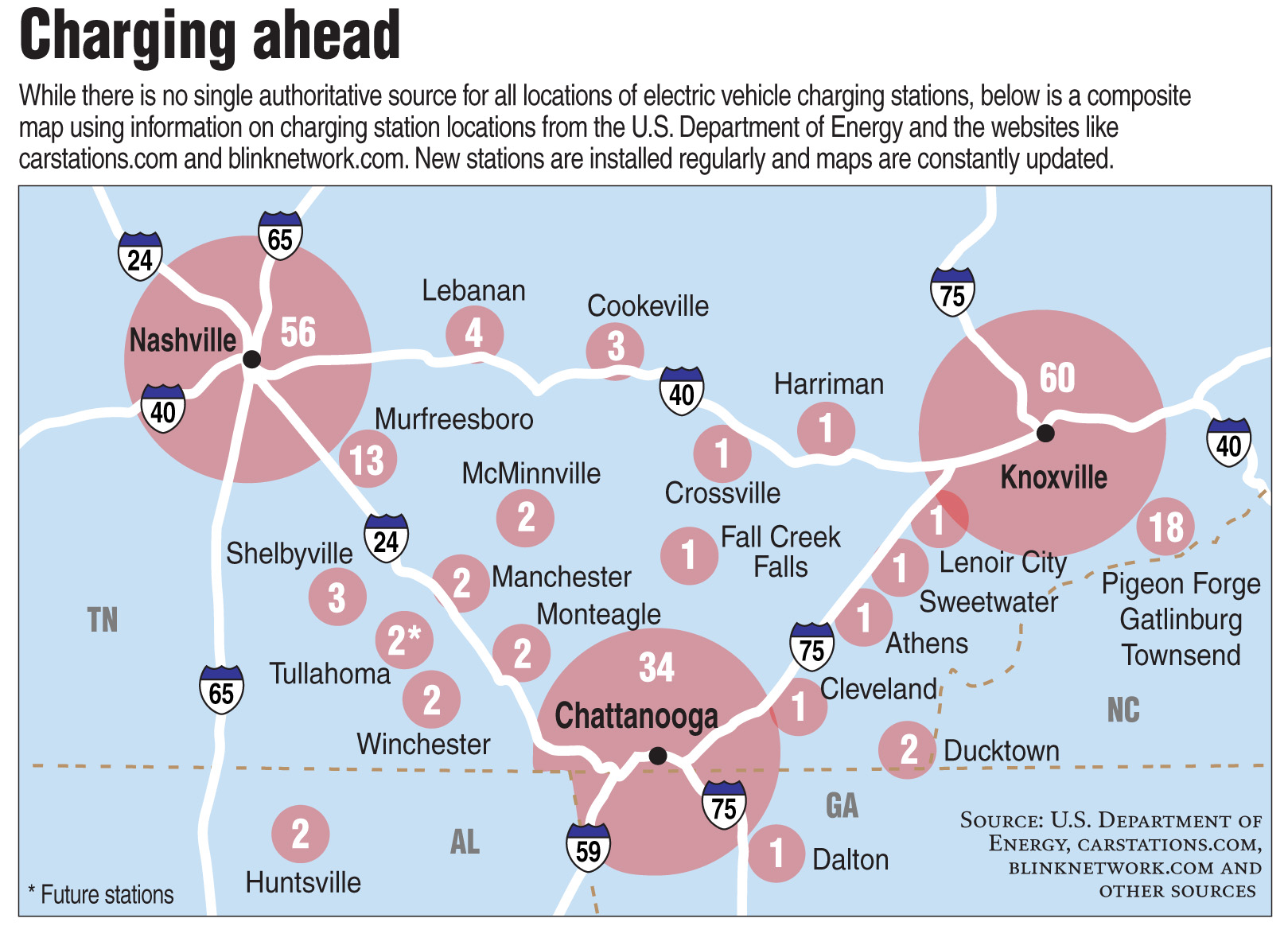Plenty of juice: Electric vehicle charging stations outnumber cars
Friday, January 1, 1904
Charging stations for electric vehicles are sprouting up across the region, but good luck finding a car plugged into one.
Stacking split-oak logs behind the Cracker Barrel restaurant in East Ridge, Tim Davis said he's never seen a car charging on one of the Blink brand charging stations the chain is installing.
"I see people pull up to them all the time, but I've never seen anybody plug up," Davis said. "It'd be a heck of a thing to roll up there dead, needing a charge, and somebody's parked there."
Charging stations aren't new to Chattanooga, but their numbers are growing.
Tennessee Department of Revenue officials estimate that at least 530 electric vehicles have been registered in Tennessee in the past two years, based on the number of buyers seeking a tax rebate. Spokesman Billy Trout said the department has issued about $1.35 million in rebates so far.
Nearly 40 charging stations are estimated in the metro Chattanooga area, most scattered around downtown and attractions such as the Choo Choo, The Chattanoogan, the Incline Railway, Ruby Falls, shopping centers and the Tennessee Aquarium. There are about 700 public charging stations across Tennessee to cater to cars such as the Nissan Leaf, Ford Focus Electric, Mitsubishi i, Smart Electric, Tesla S and Roadster.
With its electric shuttle buses, Chattanooga has been at the forefront of alternative transportation for more than two decades.
In the last couple of years, San Francisco-based firm ECOtality launched an effort to install thousands of chargers in Tennessee homes, businesses and municipalities. It's part of a $230 million, five-state electric vehicle project by the U.S. Department of Energy.
On Tuesday, ECOtality announced that Sears stores in Tennessee will host Blink's latest direct-current, or DC, chargers. The units can charge an electric car's battery to 80 percent capacity in less than 30 minutes, ECOtality officials said.
Jim Frierson, an advocate of Chattanooga as a testing ground for advanced transportation technology, said infrastructure to support electric vehicles must keep pace with technology and manufacturing or people will never buy them.
Many electric vehicle buyers love new technology and want to be better stewards of the environment, said Frierson, who drives a hybrid-electric Toyota Prius because he travels a little too far each day to rely solely on batteries.
Most electrics cost $30,000 to $40,000, but some soar as high as $100,000 or more. The Chevrolet Volt, an "extended range" car, has a gasoline engine that recharges the battery but does not power the wheels. The Volt goes about 35 miles before needing a charge, while cars like the Leaf can go about 70, officials said.
Potential customers are encouraged with a $2,500 to $7,500 federal tax credit and a $2,500 rebate in Tennessee.
GET ON BOARD
Let's say you're ready to back up all that tree-hugging, environmentally sustainable, save-the-Earth talk and commit to battery-powered travel.
In an area where the blacktop crisscrosses mountains, valleys and thousands of square miles of rural countryside, what's it like to go all electric?
First, the cost. Using Blink chargers as an example, users pay $1 for a "Basic" charge, $1.50 for a "Plus" charge. It's $2 an hour for nonmembers.
Drew Frye, a power utilization engineer at TVA, has tested most of the electric vehicles on the market as part of the utility's EV Project.
Frye said he expected the cars to be expensive, slow and short-range. But he discovered they are fun to drive and save money.
"Electric motors have instant torque, so you get a good 'launch' when you start to accelerate," he said. "The acceleration is completely smooth. There's no transmission to shift gears, so you never have that jerk where you shift gears. It's just constant smooth, quiet acceleration.
"They're actually low to the ground and sporty to drive," he said. "Everyone is pleasantly surprised."
How many miles?
People who live along rural roads without charging stations might envision a new sight on their doorstep: a stranded motorist with a drop cord instead of an empty gallon jug, looking to borrow a few kilowatts.
But Frye believes most drivers would be able to plan their routes, especially as more charging stations keep sprouting up.
Frye has taken the Volt and Leaf on road trips from Chattanooga to Nashville and from Chattanooga to Knoxville.
The Volt can't get stranded as long as the combustion charging engine has gas, but that takes environmentally unfriendly gasoline, he said.
In the Leaf, "I stopped at the fast-charge charging stations at the Cracker Barrels off the interstate, and in about 20 to 30 minutes you take the car from 20 to 80 percent on the battery," he said.
A fully charged electric car can get from Chattanooga to the Cracker Barrel in Athens‚ Tenn., about 60 miles or so, on a single charge.
"You can get a sweet tea, and about 25 minutes later you head on your way and you can get to Knoxville," he said. The same strategy and two charging stops will get an all-electric to Nashville.
Sierra Club member and 2011 Nissan Leaf owner David Graham said he went electric after a test drive. He was "totally amazed by the feel and the ride of the car, the quietness of it and the acceleration. It was an interesting-looking vehicle. Different."
Graham commutes about 28 miles a day, and he sometimes hits chargers at Rock City and the Incline Railway.
"It does use a lot more of the battery charge when you're going up steep inclines, but when you're coming down an incline, it has regenerative brakes, so it generates power and puts it onto your battery," he said.
Now that the new has worn off, what appeals to Graham is "the fact that I'm using no gasoline in driving to and from work," he said.
His gas-hog sport utility vehicle only sees a gas station once a month since it's used so little.
"When I go gas up, it feels really strange," he said.


